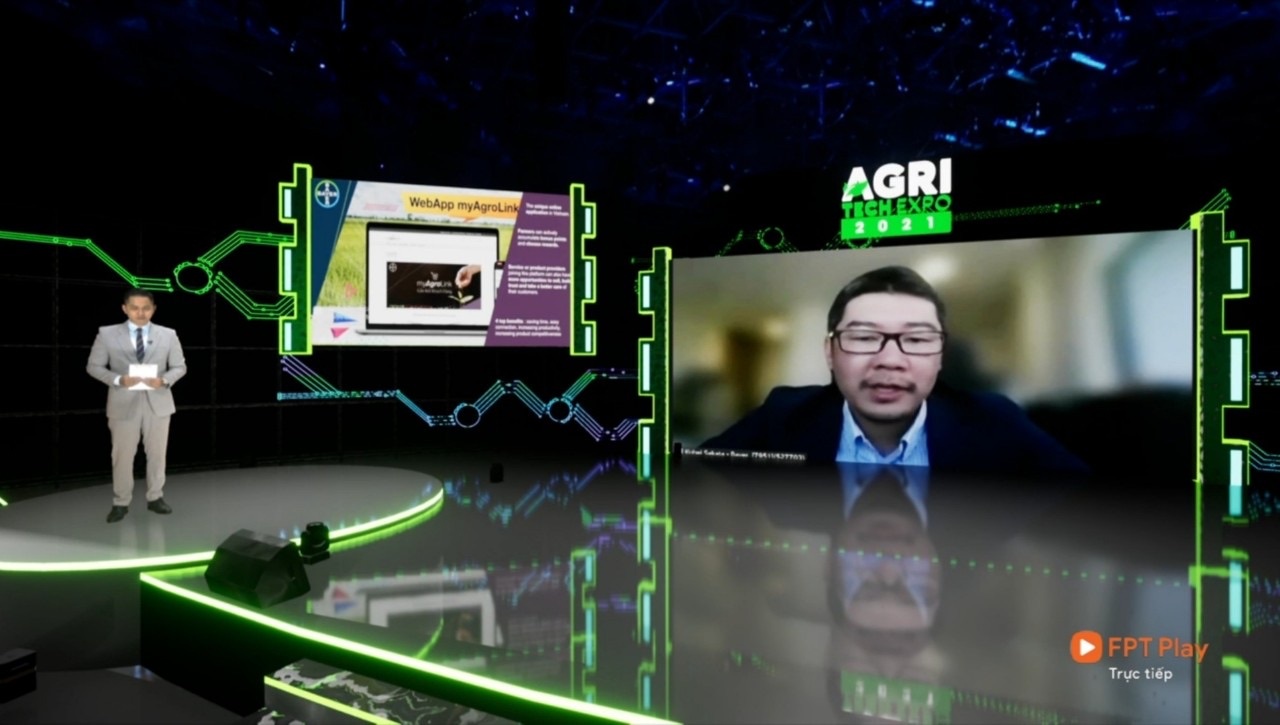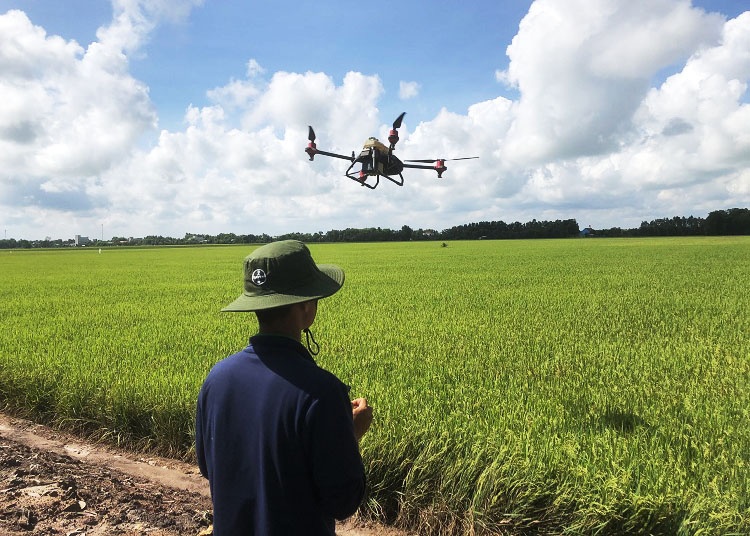Digital transformation to help Vietnam's agricultural sector survive COVID-19 storm
 |
| Digital transformation to help Vietnam's agricultural sector survive COVID-19 storm |
Over the years, climate change has had a marked negative impact on agriculture in Vietnam, particularly in the Mekong Delta and the Central Highlands. The COVID-19 pandemic has rubbed salt into the wound as movement curbs have interrupted supply chains. Farmers are unable to sell their produce while consumers are struggling to buy food in the southern provinces, in a frustrating paradox created by COVID-19 travel restrictions and the closures of both wholesale and retail markets as a result.
In the face of many challenges, it is important for the agricultural sector to accelerate the digital transformation process to sail through the tough time. However, the Overview Report of Vietnam Agricultural Digital Transformation in 2021 reveals that the percentage of agricultural enterprises interested in digital transformation is still very low. Lack of needful resources, digital infrastructure, and financial preparation are key barriers to adopt the digitalisation process in Vietnamese agriculture.
Furthermore, farmers play an important role in agricultural digital transformation but it is not easy for them to approach and adapt new technologies. So, more training and support are needed to equip farmers with the necessary digital tools.
Commenting on this problem, Kohei Sakata, head of Digital Farming Solution Incubator of Asia-Pacific region at Bayer Corporation shared in the Vietnam Agriculture Digital Transformation International Forum 2021that there are many digital farming solutions on the market but they are not designed for smallholder farming. Most of these solution focus on commercial farming with large acres with high affordability. When it comes to the pain points of the smallholder farmer segment in Vietnam, the biggest challenge is that the value chain is broken and farmers cannot capture value they created due to this value chain inefficiency.
 |
For example, smallholder farmers may be able to improve productivity and quality of harvest by digital farming solutions such as drones or disease prediction solutions. However, they cannot enjoy full value if they do not have silage capacity of harvest since they have no leverage to negotiate with the middlemen collecting the harvest. Thus, it is very important to address systemic value chain challenges when it comes to developing digital farming solutions for smallholders.
Another challenge is the fragmented and hyperlocal nature of smallholder farming. Based on geo-location, climate condition, local ecosystem including infrastructure maturity and type of crops, there are thousands of unique agronomic challenges. This makes fragmentation and many isolated agri-tech solution from startups and other enterprises. So far, there have not been any truly scalable solutions and it is very clear that a one-size-fit-all solution approach will not work.
“Last but not least, we also need to be very mindful and creative to drive behavioural change of smallholders toward digital farming solutions,” Sakata said. “They are not digitally savvy and sometimes lack access to digital infrastructure. They also heavily rely on the existing ecosystem such as retailers, agriculture extension officers, and lead farmers. In agriculture, seeing is believing and we have to think about this issue.”
Realising this gap, Bayer, a world leader in modern sustainable agriculture and non-agriculture solutions, has taken action to promote digital farming technologies in Vietnam. With the hope of supporting farmers in Vietnam overcome difficulties caused by climate change and COVID-19 as well as drive the development of sustainable agricultural practices, Bayer Vietnam has been implementing a number of digital projects.
My Agrolink is a unique online application in Vietnam that connects farmers with reputable agricultural service providers. If a farmer faces a problem in their field, they can reach out directly to technical experts through these mobile apps to quickly get the answers they need, regardless of distance.
Meanwhile, the Airfarm application supports Vietnamese farmers to connect with reputable spraying service providers in their province and arrange a spraying schedule. It not only helps farmers to ensure the quality of the order but also a channel for farmers to give or receive feedback and solve related problems after spraying.
Another solution is FarmRise digital advisor, currently available in India with 100,000 active monthly users. It is a digital platform for Android mobile devices. It provides agronomic information and advice relevant to smallholder farmers, helping you make informed decisions to reduce costs, increase yield and get better price for their output. FarmRise provides farmers with agriculture information in multiple languages that is timely, trusted, and accurate.
Besides bringing new digital farming technologies, Bayer also drives value chain partnership and an ecosystem approach to speed up digital transformation in the agricultural sector. “Nobody can resolve systemic challenges alone, and we have to establish compatibilities across different digital farming applications and platforms. Instead of collecting and capturing data within one company or one system, it is important to develop a mechanism to allow data-sharing to develop advanced analytics solutions while we address data privacy, security, and localisation requirement from both farmers and regulators,” Sakata stressed.
To facilitate the goal, Bayer is proactively seeking and establishing partnership where the group can jointly resolve farmers' pain points. Bayer has recently announced partnership with Rabobank in ASEAN countries, and the group is going to solutions and ecosystem to leverage complementary expertise from two parties to bring financial inclusion expertise from Rabobank and agriculture input expertise from Bayer.
As the largest innovative agricultural input company in the world, Bayer is committed to the principles of sustainable development. Bayer is mindful that more needs to be done to help the resilience of Vietnam’s farmers and food system following COVID-19 disruptions. The innovative products, technology, practices, and partnerships are essential to improving agricultural sector development, farmer’s livelihoods, and have an influential role in reducing the environmental impact of agriculture.
“Through the digitalisation of our pipeline, supply chain, and interactions with farmers, we know more than ever about our customers’ fields, how our products are used, and how they perform. By digitally connecting farmers with these new data sets, we can provide solutions that best support the decisions they make every day, from planting to harvest. With the integrated innovative agricultural solutions, this can benefit farmers’ productivity, and efficiency,” Sakata noted.
Moving forward, Bayer looks forward for further opportunities to closely collaborate with the Vietnamese government and other stakeholders contributing to sustainable benefits and development in the agricultural sector in Vietnam. Bayer is aiming to expand ecosystem partnership with likeminded value chain partners to achieve its sustainability commitment of empowering 100 million smallholders including those in Vietnam by 2030.
What the stars mean:
★ Poor ★ ★ Promising ★★★ Good ★★★★ Very good ★★★★★ Exceptional
Related Contents
Latest News
More News
- VNPAY and NAPAS deepen cooperation on digital payments (February 11, 2026 | 18:21)
- Vietnam financial markets on the rise amid tailwinds (February 11, 2026 | 11:41)
- New tax incentives to benefit startups and SMEs (February 09, 2026 | 17:27)
- VIFC launches aviation finance hub to tap regional market growth (February 06, 2026 | 13:27)
- Vietnam records solid FDI performance in January (February 05, 2026 | 17:11)
- Manufacturing growth remains solid in early 2026 (February 02, 2026 | 15:28)
- EU and Vietnam elevate relations to a comprehensive strategic partnership (January 29, 2026 | 15:22)
- Vietnam to lead trade growth in ASEAN (January 29, 2026 | 15:08)
- Japanese business outlook in Vietnam turns more optimistic (January 28, 2026 | 09:54)
- Foreign leaders extend congratulations to Party General Secretary To Lam (January 25, 2026 | 10:01)

 Tag:
Tag:

















 Mobile Version
Mobile Version